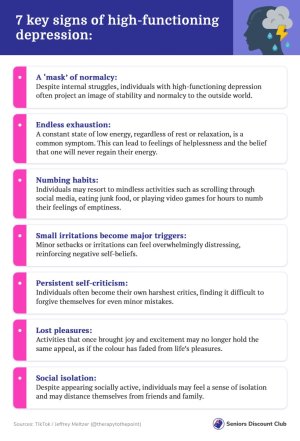Discover the 7 signs of high-functioning depression many tend to overlook
By
VanessaC
- Replies 3
Disclaimer: This article cannot be considered medical advice. Remember to consult with your doctor for a more accurate diagnosis.
High-functioning depression, a term often used to describe individuals who maintain their daily responsibilities while privately battling depression, is a condition that is often overlooked due to its subtle symptoms.
It's not an official clinical diagnosis, but it's a term that's gaining traction in mental health discussions.
According to Cleveland Clinic, it is also sometimes confused with persistent depressive disorder (PPD), a mild to moderate chronic depression.
Jeffrey Meltzer, a 29-year-old therapist, uses social media to raise awareness on mental health conditions such as depression, anxiety, and narcissistic personality disorder.
His recent viral video, which listed down the most common symptoms of high-functioning depression, has sparked a conversation about this often overlooked condition.
Understanding High-Functioning Depression
High-functioning depression is a paradoxical condition.
On the surface, individuals may appear to be coping well with life's demands.
'You take care of important things, work, school, bills. On the outside, everything seems normal, but on the inside, you're feeling empty and numb,' Meltzer explained.
Meltzer also highlighted seven signs of high-functioning depression everyone should look out for:
Meltzer's video has resonated with many, garnering over 8.1 million views and more than 5,100 comments.
You can watch Meltzer’s full video below:
Video source: TikTok/@therapytothepoint.
Many viewers identified with the symptoms, sparking a dialogue about the prevalence and impact of high-functioning depression.
'[Number two] is how my [doctor] diagnosed me,' one shared.
'I never considered myself depressed but was endlessly exhausted. Wellbutrin [antidepressant] changed my life.‘
'This has been me for over 10 years but the “high function” part is starting to crack. Not sure how much longer I can keep this up,' another commented.
While a third shared: 'After years of therapy, I have really started to come out of a life long depression. It’s crazy how much I was missing out on.'
Understanding and Recognising High-Functioning Depression in Seniors
It's important to note that high-functioning depression can affect individuals of all ages, including seniors.
In fact, the condition may be particularly prevalent among older adults who may attribute their symptoms to the natural ageing process or existing physical health conditions.
Seniors with high-functioning depression may continue to engage in their daily activities, such as attending social events, maintaining their homes, and even caring for others, all while battling feelings of sadness, fatigue, and worthlessness.
They may also experience physical symptoms, such as significant weight loss or gain, changes in appetite or sleep patterns, which can often be mistaken for signs of other health issues common in older age.
The challenge with high-functioning depression in seniors is that it can go unnoticed and undiagnosed, leading to a lack of necessary treatment and support.
Therefore, it's crucial for seniors and their loved ones to be aware of these signs and seek professional help if they suspect high-functioning depression.

If you or someone you know is struggling with mental health issues, don't hesitate to seek help.
You can reach Lifeline at 13 11 14 or Beyond Blue at 1300 22 4636 for support.

What are your thoughts on this, dear members? Let us know in the comments below.
High-functioning depression, a term often used to describe individuals who maintain their daily responsibilities while privately battling depression, is a condition that is often overlooked due to its subtle symptoms.
It's not an official clinical diagnosis, but it's a term that's gaining traction in mental health discussions.
According to Cleveland Clinic, it is also sometimes confused with persistent depressive disorder (PPD), a mild to moderate chronic depression.
Jeffrey Meltzer, a 29-year-old therapist, uses social media to raise awareness on mental health conditions such as depression, anxiety, and narcissistic personality disorder.
His recent viral video, which listed down the most common symptoms of high-functioning depression, has sparked a conversation about this often overlooked condition.
Understanding High-Functioning Depression
High-functioning depression is a paradoxical condition.
On the surface, individuals may appear to be coping well with life's demands.
'You take care of important things, work, school, bills. On the outside, everything seems normal, but on the inside, you're feeling empty and numb,' Meltzer explained.
Meltzer also highlighted seven signs of high-functioning depression everyone should look out for:
Meltzer's video has resonated with many, garnering over 8.1 million views and more than 5,100 comments.
You can watch Meltzer’s full video below:
Video source: TikTok/@therapytothepoint.
Many viewers identified with the symptoms, sparking a dialogue about the prevalence and impact of high-functioning depression.
'[Number two] is how my [doctor] diagnosed me,' one shared.
'I never considered myself depressed but was endlessly exhausted. Wellbutrin [antidepressant] changed my life.‘
'This has been me for over 10 years but the “high function” part is starting to crack. Not sure how much longer I can keep this up,' another commented.
While a third shared: 'After years of therapy, I have really started to come out of a life long depression. It’s crazy how much I was missing out on.'
Understanding and Recognising High-Functioning Depression in Seniors
It's important to note that high-functioning depression can affect individuals of all ages, including seniors.
In fact, the condition may be particularly prevalent among older adults who may attribute their symptoms to the natural ageing process or existing physical health conditions.
Seniors with high-functioning depression may continue to engage in their daily activities, such as attending social events, maintaining their homes, and even caring for others, all while battling feelings of sadness, fatigue, and worthlessness.
They may also experience physical symptoms, such as significant weight loss or gain, changes in appetite or sleep patterns, which can often be mistaken for signs of other health issues common in older age.
The challenge with high-functioning depression in seniors is that it can go unnoticed and undiagnosed, leading to a lack of necessary treatment and support.
Therefore, it's crucial for seniors and their loved ones to be aware of these signs and seek professional help if they suspect high-functioning depression.
Tip
Remember, it's okay to ask for help. Mental health is just as important as physical health, and there are resources available to support you.
If you or someone you know is struggling with mental health issues, don't hesitate to seek help.
You can reach Lifeline at 13 11 14 or Beyond Blue at 1300 22 4636 for support.
Key Takeaways
- Therapist Jeffrey Meltzer discussed the symptoms of high-functioning depression, which is not a clinically recognised diagnosis but is commonly understood as privately battling with depression while maintaining daily functions.
- He identified seven signs of high-functioning depression, including wearing a 'mask' of normalcy, enduring endless exhaustion, engaging in numbing habits, reacting strongly to small irritations, persistent self-criticism, loss of pleasure in activities, and social isolation.
- Resources for mental health support were provided, highlighting the importance of seeking help if experiencing symptoms of depression.









